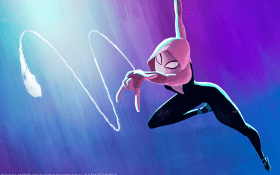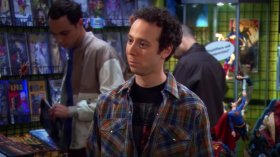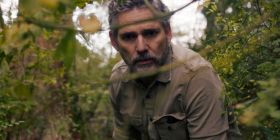Some guy in London put a hat on last Saturday, but now this week all eyes travel north to Liverpool, from where a pageant of music and nationalism will be watched around the world. That’s right: it’s Eurovision week!
While Ukraine won the 2022 contest with Stefania by Kalush Orchestra – a sentimental tribute to maternal strength – obviously the ongoing Russian invasion of Ukraine means the winner can’t host this year’s contest at home. So the second-placed UK is hosting on Ukraine’s behalf under the theme ‘United by Music’.
SBS begins its Eurocoverage this Wednesday, hosted by Myf Warhurst and Joel Creasey. To participate in the televoting, you’ll need to watch live from Liverpool at a bruising 5am AEST – Semi-Final 1 on Wednesday morning, Semi-Final 2 on Friday morning, and the Grand Final on Sunday morning.
If you’d rather sleep in, each semi-final will be on SBS On Demand by midday on the day of broadcast, and the Grand Final will be up by 3pm on Sunday. SBS is not neglecting its traditional prime-time broadcasts: catch Semi-Final 1 at 7:30pm on Friday night, Semi-Final 2 on Saturday night, and the Grand Final on Sunday night.
Australia’s entry, Perth synth-prog-metal band Voyager, has drawn the 16th and final performance slot in Semi-Final 2 – which is widely seen as an advantage, as they’ll be fresh in the minds of Eurovision voters.
How advanced will Australia fare?
Quick recap: last year, Sheldon Riley gave a barnstorming performance of ‘Not the Same’ that saw Australia qualify second in its semifinal. But the national juries of music-industry professionals liked his dramatic ballad much more than the televoting viewers.
Read: Sheldon Riley, Australia’s Eurovision hope: ‘I don’t get nervous’
Why? Eurovision viewers love gimmicks and action, but Riley’s stagecraft was very static. He had no backup performers, covered his face with a jewelled veil, and walked slowly up a monumental staircase. This scored him only two televoting points in the final (cheers Azerbaijan) for an overall 15th place.
A change to this year’s voting system makes pandering to televoters even more vital, as the national juries will no longer vote during the semi-finals. Also, viewers from non-participant countries can now vote as ‘Rest of the World‘, which will be weighted as one country. (Some countries will not be eligible for this vote; the organisers aren’t saying who, but everyone’s thinking Russia.)
Which brings us to Voyager. They’ve been around for years – and, importantly, have toured Europe a lot. Don’t compare them to the growling Finnish metal monsters of Lordi; think neon bisexual lighting, synchronised head banging and keytars.
Voyager’s prog/metal/synthwave sound draws heavily on 1980s nostalgia, from videogames to sci-fi soundtracks. There’s an exhilarating, Van Halen-meets-Toto arena vibe to ‘Promise’ that could do well at Eurovision.
They’re also bringing a real car onstage: a 1988 Toyota MR2, as seen in vintage anime like Tokyo Vice. Lead singer Danny Estrin’s own first car was an MR2, which has featured in previous Voyager music videos. At Eurovision, it’s part of the Michael Mann-style fantasia of ‘Promise’: escaping a chaotic city to find solace out on the open road.
I think Australia’s gonna do alright. But here are some other songs that could be real contenders.
Sweden: ‘Tattoo’ by Loreen
Sweden’s Loreen is this year’s clear favourite. In 2012, she destroyed all comers with ‘Euphoria‘, one of Eurovision’s greatest winners. However, in 2023 she’ll have her work cut out, as previous Eurovision winners tend to bomb when they try again. Melbourne-born Johnny Logan is the only singer who’s ever had multiple wins; he won for Ireland in 1980, 1987 and 1992.
‘Tattoo’ went to number one in Sweden and has charted in 14 other countries. Like ‘Euphoria’, it builds from an enigmatic verse to an incredibly catchy chorus – I’ve had it stuck in my head for days. Loreen’s also clearly seeking to recapture the radical simplicity of her 2012 staging, but maybe it’s too dull this year? She’s trapped in a sandwich of fog and golden light, wearing extremely long fingernails like a Thai dancer.
France: ‘Évidemment’ by La Zarra
France is among the ‘Big Five’ countries that, along with the host, never have to compete in the Eurovision semi-finals: so this year, that’s Italy, Spain, Germany, the UK and Ukraine. This song is highly fancied in the Grand Final.
Beginning from a dramatic ballad in the chanson style, it explodes into a sophisticated disco stomper. La Zarra, who is from Québec, will be appearing on a super-tall plinth draped in sparkly fabric, like a Dolly Varden. Some fans thought they saw the structure wobbling during rehearsal – will it be an ‘I fall tower’? Pas encore, évidemment.
Finland: ‘Cha Cha Cha’ by Käärijä
Personally, I think this is horrible: like Finland’s answer to The Prodigy. Käärijä has a Henry V haircut and guyliner, favours industrial-goth black rubber spikes and a puffer shrug made out of lime-green pool floaties, and shouts from a boxing ring while surrounded by demonic ballroom dancers.
However, begrudgingly I accept this is vintage Eurovision – plus it has a shout-along chorus. Furthermore, fans are obsessed with the bromance between Käärijä and Bojan Cvjetićanin, lead singer of Slovenian indie-rock cuties Joker Out. Plus ‘Cha Cha Cha’ is the final act in Semi-Final 1, which will make it top of mind as people get out their phones to vote.
Norway: ‘Queen of Kings’ by Alessandra
Imagine, if you will, a feminist electro sea shanty. Norway often fields an act with a vague Viking vibe, but Alessandra Mele’s galloping, adventurous melody and lyrics about “spreading her wings” and “she will be the warrior of the north and southern seas” will remind many of Game of Thrones.
I prefer the similarly themed Czech entry: ‘My Sister’s Crown’ by Vesna, a catchy pan-Slavic anthem with lyrics English, Czech, Ukrainian and Bulgarian. Also, Eurovision lore is that the first performer in a given lineup always struggles in the voting, so Alessandra will have to crush her opening slot in Semi-Final 1.
Ukraine: ‘Heart of Steel’ by Tvorchi
Electro duo Tvorchi – which is Ukrainian for ‘creatives’ – met as pharmacy students at Ternopil National Medical University. They wrote this song during the siege of Mariupol, where Ukrainian soldiers made their stand in a steelworks – so I can forgive dodgy English lyrics like ‘Get out of my way / cos I’ve got a heart of steel’.
More directly, this is about the dangers of nuclear warfare – which explains the backing dancers in gas masks. Look out, as well, for some evocative projections. Will Ukraine pull off back-to-back wins?
Cyprus: ‘Break A Broken Heart’ by Andrew Lambrou
I’m still mad that Cyprus was robbed at Eurovision 2018, when Eleni Foureira’s stupendous ‘Fuego’ lost to an Israeli novelty song. (I boycotted Eurovision 2019 in solidarity with Palestine.) This year, Aussie lad Andrew Lambrou is repping his Cypriot roots with this power ballad about bouncing back from a bad breakup.
His soaring falsetto adds an anthemic quality, but should make this interesting to hear live. From rehearsal footage, it sounds like Lambrou will have some help from backing vocals to hit those high notes.
Spain: ‘Eaea’ by Blanca Paloma
This is one of my favourites: a thrilling combination of electronica with flamenco vocals and polyrhythms. Paloma has explained the song is a homage to her grandmother, and more generally to female ancestors; at times she almost sounds muezzin-like here, reminding me of the Muslim influences on traditional Spanish music.
Belgium: ‘Because of You’ by Gustaph
Gustaph is a veteran backing vocalist: he’s worked with the alt-disco project Hercules and Love Affair, as well as at Eurovision in 2018 and 2021. He’s known for his oversized cowboy hats and sculptural clothing: in this year’s contest he’s going for a combo of white and candied-almond pink.
The song hits all the sweet spots of the 1990s gospel-house revival: euphoric chorus harmonies; classic soul samples; silhouetted, vogueing figures. However, it’s catchy in a paradoxically tasteful way that’s maybe not outrageous enough to get it over the line at Eurovision. Indeed, I have to admit at times it reminded me … I’m sorry, Gustaph … of Simply Red.
Watch Eurovision 2023 at the official SBS Eurovision Song Contest hub, or catch it on SBS TV and SBS On Demand from Wednesday 10 May





